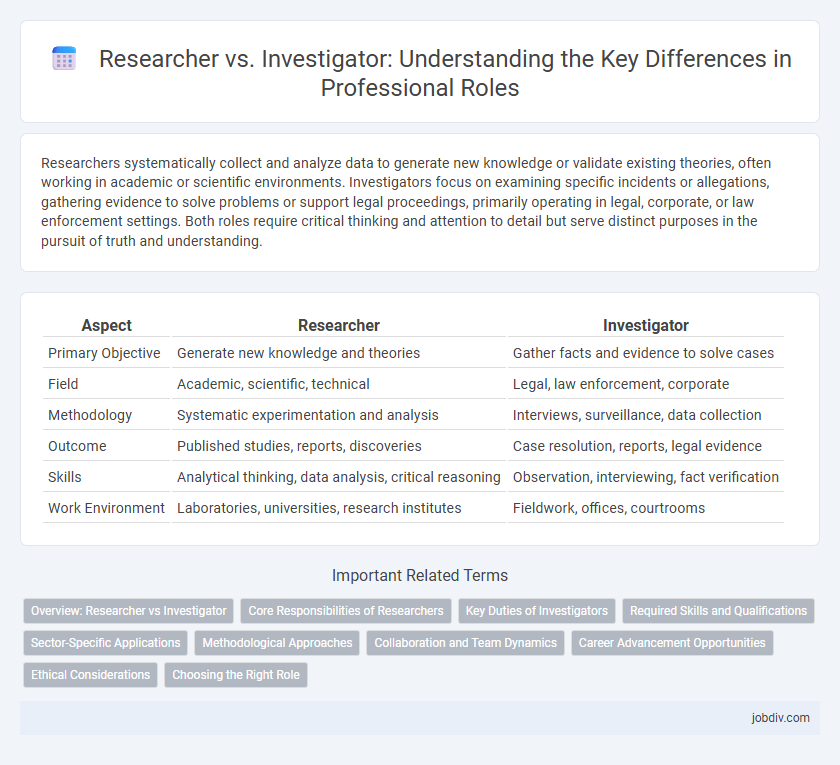Researchers systematically collect and analyze data to generate new knowledge or validate existing theories, often working in academic or scientific environments. Investigators focus on examining specific incidents or allegations, gathering evidence to solve problems or support legal proceedings, primarily operating in legal, corporate, or law enforcement settings. Both roles require critical thinking and attention to detail but serve distinct purposes in the pursuit of truth and understanding.
Table of Comparison
| Aspect | Researcher | Investigator |
|---|---|---|
| Primary Objective | Generate new knowledge and theories | Gather facts and evidence to solve cases |
| Field | Academic, scientific, technical | Legal, law enforcement, corporate |
| Methodology | Systematic experimentation and analysis | Interviews, surveillance, data collection |
| Outcome | Published studies, reports, discoveries | Case resolution, reports, legal evidence |
| Skills | Analytical thinking, data analysis, critical reasoning | Observation, interviewing, fact verification |
| Work Environment | Laboratories, universities, research institutes | Fieldwork, offices, courtrooms |
Overview: Researcher vs Investigator
A researcher systematically explores theories and collects data to generate new knowledge across various disciplines, emphasizing hypothesis testing and analysis. An investigator primarily focuses on examining specific cases or incidents, often within legal, medical, or corporate contexts, aiming to uncover facts and evidence. Both roles demand critical thinking, but researchers prioritize experimental or observational studies, while investigators concentrate on fact-finding and verification processes.
Core Responsibilities of Researchers
Researchers primarily design and conduct studies to generate new knowledge by formulating hypotheses, collecting data, and analyzing results. Their core responsibilities include literature review, experimental design, data interpretation, and publishing findings in academic journals. Unlike investigators who focus on problem-solving and inquiry within specific cases, researchers emphasize systematic exploration and validation of scientific theories.
Key Duties of Investigators
Investigators primarily focus on designing and conducting systematic inquiries to collect, analyze, and interpret data related to specific hypotheses or cases. They are responsible for ensuring compliance with legal standards, maintaining detailed records, and safeguarding the integrity of the evidence throughout the investigative process. Key duties include interviewing witnesses, coordinating with law enforcement or regulatory bodies, and presenting findings to support decision-making or legal actions.
Required Skills and Qualifications
Researchers require strong analytical skills, proficiency in data collection and analysis, and often hold advanced degrees in their field. Investigators need expertise in conducting thorough investigations, attention to detail, and may possess certifications in areas like forensics or law enforcement. Both roles demand critical thinking, problem-solving abilities, and effective communication to interpret findings and present results accurately.
Sector-Specific Applications
Researchers primarily engage in generating new knowledge through systematic study and experimentation, often within academic or scientific sectors. Investigators apply targeted inquiry techniques to gather evidence and solve problems, commonly working in legal, forensic, or corporate compliance fields. Sector-specific applications dictate distinct methodologies and objectives, with researchers emphasizing hypothesis testing and investigators focusing on fact-finding and case resolution.
Methodological Approaches
Researchers employ systematic methodologies such as hypothesis formulation, experimental design, and statistical analysis to generate new knowledge across varied disciplines. Investigators focus on applying forensic techniques, evidence collection, and analytical frameworks to solve specific cases or verify facts within legal or regulatory contexts. Both roles prioritize rigor and accuracy but differ fundamentally in scope: researchers advance theoretical understanding, while investigators seek practical resolution.
Collaboration and Team Dynamics
Researchers and investigators both play crucial roles in collaborative projects, where effective communication and shared goals drive successful outcomes. Researchers typically focus on generating hypotheses and analyzing data, while investigators prioritize executing experiments and collecting empirical evidence within team settings. Strong collaboration fosters interdisciplinary synergy, enhancing problem-solving by integrating diverse expertise in research and investigation processes.
Career Advancement Opportunities
Researchers often have broader career advancement opportunities in academia, focusing on generating new knowledge and publishing findings that can lead to tenure or leadership roles. Investigators typically advance within organizations like law enforcement or clinical trials, emphasizing project management and direct application of findings to solve specific problems. Both paths require strong analytical skills, but career growth depends on the sector's emphasis on innovation versus execution.
Ethical Considerations
Researchers must prioritize ethical considerations such as obtaining informed consent, ensuring participant confidentiality, and minimizing harm during data collection. Investigators are responsible for adhering to institutional review board (IRB) protocols and maintaining transparency in reporting findings to uphold research integrity. Both roles demand rigorous compliance with ethical guidelines to promote trust and credibility within the scientific community.
Choosing the Right Role
Choosing the right role between a researcher and an investigator depends on the primary objective: researchers focus on generating new knowledge through systematic experimentation and analysis, while investigators concentrate on uncovering facts, often related to legal or compliance matters. Researchers typically work in academic or scientific settings, emphasizing hypothesis-driven studies and data collection, whereas investigators are commonly employed by law enforcement, corporate entities, or legal firms to conduct inquiries and gather evidence. Understanding the specific demands of your project or organization helps align your skills with the appropriate responsibilities, ensuring effective outcomes and career development.
Researcher vs Investigator Infographic

 jobdiv.com
jobdiv.com